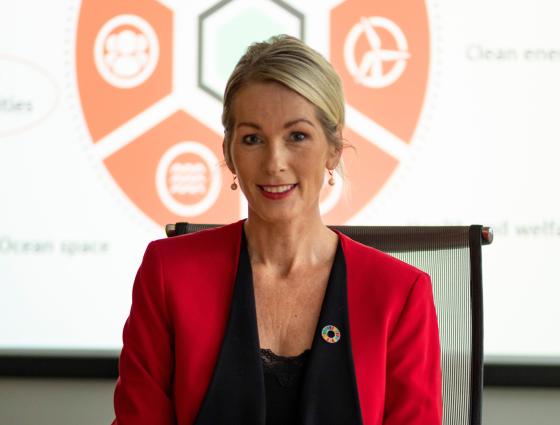The EU will support innovative women
Innovation will be given greater focus in the ongoing EU effort to design the next research and innovation framework programme. This represents a good opportunity to improve the gender balance in innovation environments, says Anita Krohn Traaseth.
“As the EU now restructures the world’s largest research and innovation platform, gender and diversity must be one of the top priorities,” says Traaseth.
Traaseth, who resigned as CEO of Innovation Norway last year, sits on the European Innovation Council (EIC) Pilot Advisory Board.
The EIC is an important instrument under Horizon Europe, the next research and innovation framework programme for the EU, which will be launched in January 2021. The advisory board is an international expert group to advise the European Commission on the final design of the EIC during this pilot period.
Venture capital for ideas targeting Corona issues
Like everything else in society, the process has been affected by the coronavirus pandemic. But the EIC advisory board members are doing their best to keep things moving forward working from home.
“We communicate through a WhatsApp group, which actually works quite well. We keep one another informed and do what we can to keep everything functioning normally. At the same time, we are trying to adapt the funding instruments to the situation we are in now,” says Traaseth.
The purpose of the EIC is to find and support ground-breaking innovation that entails high risk, and to invest in small and medium-sized innovative companies with the potential for rapid growth. This will be achieved by providing access to venture capital through a combination of support schemes, loans and private investments.
The EIC, currently in a pilot phase, is testing out instruments while its long-term objectives are still being established. When the COVID-19 outbreak erupted, the EIC quickly issued a call for funding for companies with innovative solutions that could help to tackle the pandemic. The next chance to seek funding is now, in April, when companies will have an opportunity to present their Corona-related ideas to private investors in a digital “speed-pitching” session.
“Traditionally, the EU framework programmes have been heavily geared towards research, and that will always be a strong factor in the EU, but Horizon Europe will have a sharpened focus on capitalizing on research ideas, creating jobs and restructuring existing industry as well,” says Traaseth.
Innovation targeting societal challenges
The upcoming framework programme will stress the need for research and innovation that helps to address the many major societal challenges facing the EU and the world at large, such as climate change, democratic challenges and the ramifications of new technology.
There is also a separate need for innovation to strengthen the ability of the European business sector to compete with the US and Asia. Now the advisory board is refining the EIC profile and formulating the language on how the European Innovation Council is to be distinctive among other support schemes.
“This is where gender and diversity come in. Very few innovation environments have an explicitly stated ambition to promote gender balance and diversity,” says Traaseth.
“It is a global problem, not just a Norwegian one, that the number of women entrepreneurs and investors is low, and that less venture capital is invested in women.
“The advisory board members are very aware that diversity leads to new ideas, and consider it to be pivotal that Europe invests in the entire population.”
Difficult to change attitudes
A report from last year that examined access to capital for start-up companies in the Nordic countries showed that EUR 2.3 billion was invested in Nordic start-ups in 2018. Of this, 88 per cent went to entrepreneurial teams with no women. Only 1.4 per cent went to all-female entrepreneurial teams, whereas in Norway this figure was 2 per cent.
According to the founder of Unconventional Ventures, Thea Messel, who initiated and led the work on the report, the survey demonstrates that investors have less faith in an idea from a woman than from a man.
Similar attitudes emerged in a large-scale UN survey presented in March this year. The results indicate that the world is definitely not on track to achieve the Sustainable Development Goal of gender equality by 2030. On the contrary, the survey indicates that 90 percent of both women and men have prejudices against women. Half the respondents believe men are better suited to be political leaders, and more than four out of ten believe men are better than women as business leaders. This is why Traaseth believes it is important for the EU to seize the opportunity to prioritize gender equality and diversity as it is reshaping research and innovation policy.
“It takes a long time to change deep-rooted cultural expectations of what women and men can do. No matter how many laws and regulations we have, and how much capital can be put on the table, this is about changing cultural norms at a fundamental level,” she says.
“What can be done on a factual basis to counter the notion, held by so many, that men are better business leaders? It is very difficult, which makes it all the more important to push for change.”
Diversity is key for sustainability
At the same time, Traaseth believes that encouraging greater gender equality and diversity in innovation environments will help to promote wider use of research and innovation to address major societal challenges. The EU has committed to ensuring that all policy areas, including its research and innovation policy, contribute towards achieving the UN Sustainable Development Goals.
“The concept of sustainability has three dimensions: an economic dimension, a social dimension, and a dimension involving climate and the environment. Everyone has to step up to the plate, and we need diversity when it comes to professional expertise as well. I am convinced that gender equality and diversity are prerequisites for greater sustainability, although I don’t have hard evidence to support this,” she says.
Traaseth herself is a member of the Working Group on Key Performance Indicators and Data, which seeks to set the course for how the EIC budget will be used.
“There we talk a lot about how the money must go to projects and initiatives that strengthen sustainability, and how we have to utilize all the talents out there. Under the most recent call for proposals, 20 per cent of the grants were reserved for female entrepreneurs. This is a way to steer the instruments directly, and that is when we start seeing some results,” she says.
“As I see it, there is a strong overall consensus that sustainability and diversity are key objectives.
“The process of prioritizing and implementing goals for gender balance and diversity is accompanied by some tough discussions, but that is always the case. The members of the board work with innovation on a daily basis, are used to thinking about these issues, and want to help to generate change here. We need a stronger Europe, we need a unified European view on innovation and that means we have to focus on diversity.”
Seeking female techno-entrepreneurs
Traaseth points out that the world is moving into a new phase of innovation that is closely aligned with the Norwegian and European business structure. Traditionally, innovation has primarily revolved around developing consumer-oriented technology and communication networks. That resulted in giant US technology companies such as Facebook and Google.
The next phase, in which innovation is to be sustainable and help to address societal challenges, requires different types of technology – business-oriented technology that consumers do not necessarily take much note of.
“Materials technology is one such example, and Norway and Europe are outstanding at this kind of technological innovation. So this coming wave of innovation will be good for Europe,” she believes.
At the same time, we know that women are in the minority among technology entrepreneurs. The EU gender equality strategy therefore paves the way for the EIC to implement targeted measures to support women’s participation in innovation and support start-up companies headed by women.
“Research has shown that there is a need for female role models, so it is incredibly important to showcase those who succeed. I think this will all take some time, which is why I believe that gender equality and diversity must be a top priority just exactly now. It must be a stated ambition, backed by relevant instruments and long-term efforts. That will make the EIC stand out from other innovation platforms that do not have similar ambitions,” says Traaseth.
Translated by Darren McKellep and Carol B. Eckmann.
The upcoming EU Framework Programme for Research and Innovation is organized into three pillars:
- one for Excellent Science,
- one for Global Challenges and European Industrial Competitiveness, and
- one for Innovative Europe.
As part of the third pillar, the The European Innovation Council (EIC) is to support ground-breaking and market-creating innovation that entails high risk, drawing from a mix of public and private capital.
The EIC is currently in a pilot phase and announces funding for a variety of purposes. An advisory board comprised of European innovation experts is helping to determine the final design of the EIC when the framework programme starts in 2021. The board's first Vision statement.
The board has 22 members, including Anita Krohn Traaseth from Norway. The members have organised their efforts in five different working groups.
Anita Krohn Traaseth
In addition to serving on the EIC board, Traaseth heads a government commission for innovation and growth in the green sector.
Traaseth served as CEO of Innovation Norway from 2014 to 2018, and has been advisor (part-time) to Curt Rice, Rector of Oslo Metropolitan University (OsloMet), for half a year.

